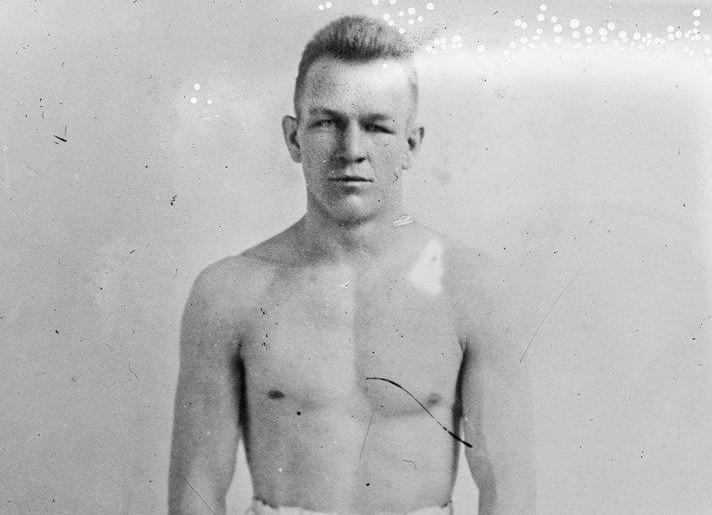Billy Miske epitomizes the essence of a fighter, his story brimming with inspiration, from the lofty dreams of grandeur to his remarkable achievements, tragically cut short by heartbreaking circumstances.
Miske navigated the “no decision” era, where the absence of a clear winner at the final bell shrouded fight records in ambiguity. Yet, for Miske, whose knockout prowess frequently left stretchers occupied post-fight, the intricacies of win-loss tallies seemed inconsequential.
He was a force to be reckoned with in the light heavyweight/heavyweight division, Miske possessed fists of thunder, yet his boxing finesse often went unnoticed amid his knockout reputation. Contrary to mere assumptions based on his record, Miske showcased his multifaceted skill set against some of history’s most formidable opponents.
As Miske embarked on his career, fluctuating fortunes mirrored his journey, compounded by mounting debts from his struggling car dealership, compelling him to seek high-profile opponents in a bid to alleviate financial strain..
With victories against formidable opponents such as Tommy Gibbons, Jack McCarron, Eddie Nearing, Jack Dillon, and Battling Levinsky, alongside a noteworthy draw with Harry Greb, Miske had undeniably established his reputation by the onset of 1918.
In May of that year, Miske battled to a draw with the legendary Jack Dempsey, a bout that marked the beginning of a countdown on his life.
A most devastating blow coming from doctors, who delivered the grim prognosis: Miske had just five years left, if luck was on his side, a prognosis more ominous than any opponent he had faced in the ring until then.
At the tender age of 24, Billy received a diagnosis of Bright Disease, known today as kidney disease. His doctor’s advice was blunt: “If you’re smart, you’ll find a comfortable couch and retire right now.”
It might have seemed reasonable for anyone to heed such advice, but due to Miske’s debts, he couldn’t afford that luxury. His dealership teetered in the red, leaving him with no choice but to step into the ring as often as possible, chasing every dollar he could pocket.
He did all this by shouldering the burden of his diagnosis alone, his family remained oblivious to his struggles.
Despite facing over 30 opponents since his diagnosis, including a rematch with Dempsey in the same year he received his devastating news, Miske’s resilience prevailed, winning more than he lost, even fighting an astounding fifteen times in 1922.
By the fall of 1923, Miske, now a frail 28-year-old, weakened considerably. With no fights since January, he longed for one last substantial bout to secure a Christmas worthy of his family’s memories.
Approaching his longtime manager, Jack Reddy, for this final fight, Miske met resistance, warned that stepping into the ring in his condition might mean risking his life. Defiant, Miske retorted, preferring the uncertainty of the ring to a passive fate.
Sympathizing with Miske’s plight, Reddy proposed a compromise: return to the gym, attempt to regain some semblance of condition, then reconsider. Yet, Miske, adamant, insisted he had only one fight left in him.
Reluctantly acquiescing to a dying man’s request, Reddy arranged a match with the rugged Bill Brennan.
Eschewing the gym as he promised Reddy, Miske instead cherished precious moments with his family, knowing the impending fight was akin to a suicide mission.
Despite Brennan’s reputation and Miske’s own fragile state, he defied the odds on November 7th in Omaha, enduring four grueling rounds before stunningly clinching a knockout victory, earning a $2,400 paycheck.
That Christmas, enveloped in warmth and love, the Miske family savored every moment, relishing in their newfound prosperity. For Miske, it was the happily-ever-after he yearned for, a final gleam of joy before embracing his inevitable fate.
The following morning, facing the reality of his imminent demise, Miske summoned Reddy, who rushed him to St. Mary’s Hospital. However, despite efforts, there was no reprieve, and on New Year’s Day 1924, Billy Miske passed away at the age of 29 from kidney failure.
His tale epitomizes mental fortitude, a testament to a man’s unwavering determination to provide for his loved ones. Miske’s legacy transcends the ring, resonating as a poignant reminder of sacrifice and resilience. In Minnesota, he remains a legend of the squared circle, honored and revered for his unparalleled grit and selflessness. Rest in peace, Mr. Miske, your legacy lives on.





